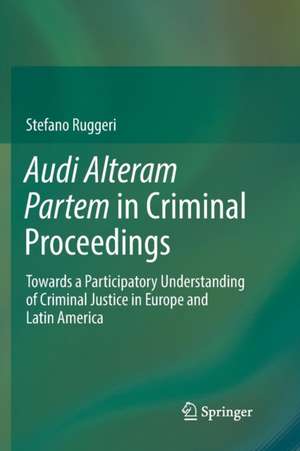Audi Alteram Partem in Criminal Proceedings: Towards a Participatory Understanding of Criminal Justice in Europe and Latin America
Autor Stefano Ruggerien Limba Engleză Paperback – 25 iul 2018
| Toate formatele și edițiile | Preț | Express |
|---|---|---|
| Paperback (1) | 1128.08 lei 6-8 săpt. | |
| Springer International Publishing – 25 iul 2018 | 1128.08 lei 6-8 săpt. | |
| Hardback (1) | 1134.55 lei 6-8 săpt. | |
| Springer International Publishing – 27 apr 2017 | 1134.55 lei 6-8 săpt. |
Preț: 1128.08 lei
Preț vechi: 1375.71 lei
-18% Nou
Puncte Express: 1692
Preț estimativ în valută:
215.93€ • 234.62$ • 181.50£
215.93€ • 234.62$ • 181.50£
Carte tipărită la comandă
Livrare economică 21 aprilie-05 mai
Preluare comenzi: 021 569.72.76
Specificații
ISBN-13: 9783319854281
ISBN-10: 3319854283
Ilustrații: XXXII, 692 p.
Dimensiuni: 155 x 235 mm
Greutate: 1 kg
Ediția:Softcover reprint of the original 1st ed. 2017
Editura: Springer International Publishing
Colecția Springer
Locul publicării:Cham, Switzerland
ISBN-10: 3319854283
Ilustrații: XXXII, 692 p.
Dimensiuni: 155 x 235 mm
Greutate: 1 kg
Ediția:Softcover reprint of the original 1st ed. 2017
Editura: Springer International Publishing
Colecția Springer
Locul publicării:Cham, Switzerland
Cuprins
Part I – Introduction to the Research: 1. Preliminary issues.- Part II – Audi Alteram Partem in National Criminal Justice. The Perspective of Domestic Law: 2. Participatory Rights in Italian Criminal Justice and the Developments Towards a Contradictoire-based Model of Criminal Proceedings.- 3. Participatory Rights in Brazilian Law and the Requirements of Contradictoire and Full Defence in Criminal Proceedings.- Part III – Audi Alteram Partem in Transnational Criminal Justice. The Perspective of Domestic Law: 4. Participatory Rights in Transnational Criminal Justice Under Italian Law.- 5. Participatory Safeguards in Transnational Criminal Justice Under Brazilian Law.- Part IV – Convergences and Divergences in the National Understanding of Participatory Rights in Domestic and Transnational Criminal Justice: 6. Common Developments and Deficiencies of the Domestic Approach to Participatory Safeguards in Criminal Proceedings.-7. Similarities and Shortcomings of the National Understanding of Participatory Rights in the Field of Transnational Criminal Justice.- Part V – Evolution of a Wideranging Participatory Approach to Criminal Justice in International Human Rights Law and EU Law: 8. Audi Alteram Partem in Criminal Proceedings Under the European Convention on Human Rights.- 9. Participatory Rights in Criminal Justice Under the American Convention on Human Rights.- 10. Harmonisation of Criminal Justice and Participatory Rights in Criminal Proceedings. New Developments in EU Law After the Lisbon Treaty.- Part VI – Developments in International and Supranational Law Towards a Participatory Understanding of Transnational Criminal Justice: 11. Participatory Rights in Transnational Criminal Justice Under the European Convention.- 12. Audi Alteram Partem in Transnational Cases Under the American Convention.- 13. Defence Rights and Participatory Guarantees Acknowledged by EU Law in theInternational Cooperation Within the Area of Freedom, Security and Justice.- Part VII – Solution Models and Principles of a Participatory Approach to Criminal Justice in International Human Rights Law and EU Law: 14. Common Principles of a Participatory Model of Criminal Proceedings in International Human Rights Law and EU Law.- 15. Solution Models for a Participatory Approach to Transnational Criminal Justice in International and Supranational Law.- Part VIII – De-formalisation of Legal Systems and Reconstruction of a Participatory Model of Criminal Justice: 16. Mutual Interaction of Systems of Human Rights Protection and the Development of a Participatory Understanding of Criminal Justice Based on Transcultural Dialogues.- 17. Concluding Findings. Proposals and Qualitative Requirements of a Participatory Model of Criminal Justice.
Textul de pe ultima copertă
This book analyses current developments in Europe and Latin America towards the greater involvement of the parties in the administration of criminal justice. Focusing on both national criminal proceedings and transnational cases, this study employs a comparative law approach to examine the shift experienced by Italy and Brazil from the long tradition of mixed criminal justice to unprecedented adversarial trends. The identification of common needs and divergences from the national approach to criminal justice paves the way for a subsequent analysis of new solution models emerging from international human rights law and EU law. To a great extent, these developments are due to the increasing impact of international human rights case-law on the criminal justice systems of the countries in question. The book concludes by proposing a set of qualitative requirements for a participatory model of criminal justice.
Caracteristici
Provides a comprehensive analysis of legislation and case law Engages in comparison at the national, international and supranational level Elaborates on solution models and proposals for both lawyers and practitioners












